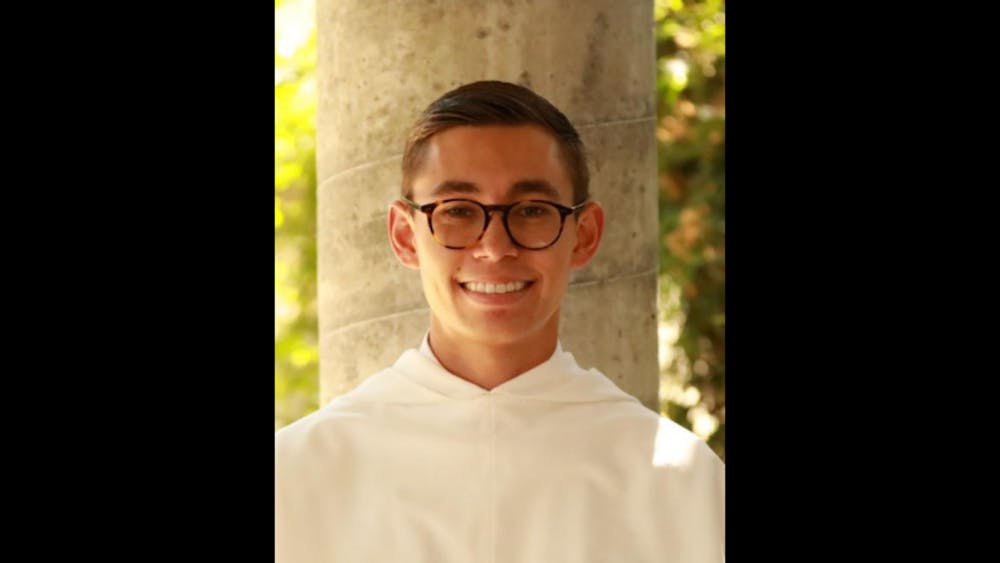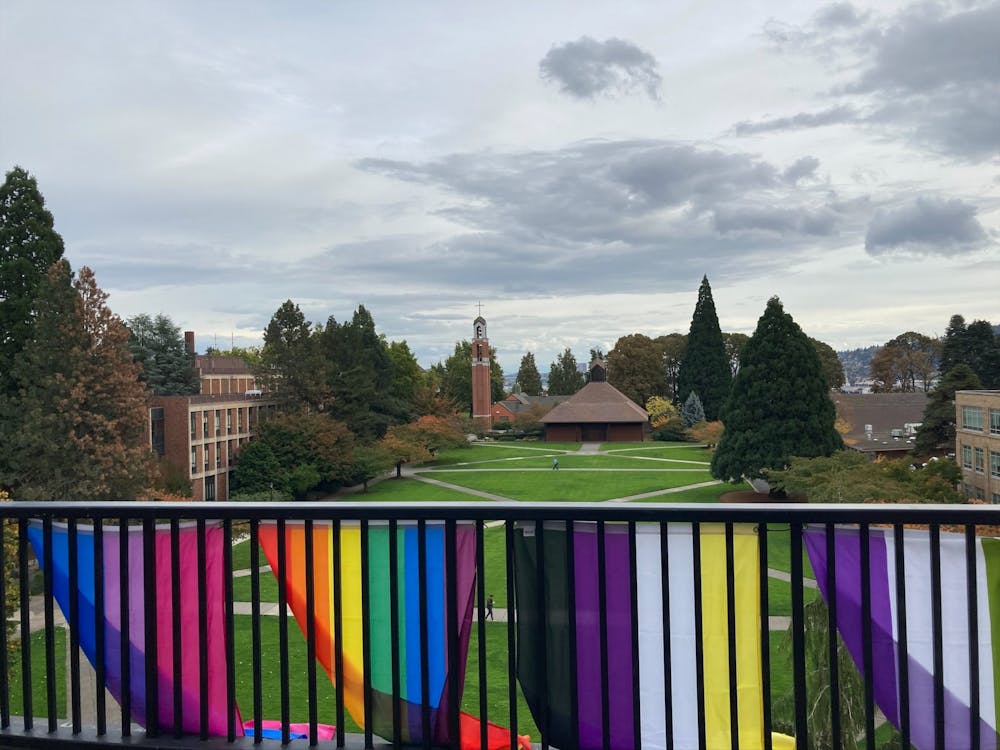This is a response to the opinion piece titled "We have come far, yet not far enough." What I would like to respond to is the inaccurate portrayal of what true Catholic teaching is on LGBTQ+ issues. In particular, I would like to focus on this statement made in the article: “This is not to say, however, that we believe Catholicism and the LGBTQ+ community are inherently incompatible. We believe that there is a way for these two communities to coexist and intersect, but not in our current campus atmosphere.”
It is mistaken to believe that authentic Catholicism and the LGBTQ+ community are compatible. It certainly is the case that a form of “Cafeteria Catholicism,” which claims the name Catholic and yet dissents from fundamental and unchangeable teachings of the Church that have been taught since its foundation, can be a worthy bedfellow of the LGBTQ+ community. But if we are talking about true Catholicism, then the two are further away from each other than the two poles of the Earth. They are founded on two completely different social and philosophical systems, which leads to vastly contradistinctive views of the world and of reality.
Let us simply look at some initiatives and goals of the LGBTQ+ community and see if they align with Catholic teaching. The first and most obvious platform is the promotion of same-sex marriage. A good Catholic, faithfully assenting to the teachings of the Church and of Jesus Christ (which are one and the same because Christ founded the Church as His body) cannot in any way support same-sex marriage. In fact, not only can he not support it, but he will not even believe it to be an ontological possibility.
Even those same-sex marriages recognized by the state and contracted by two individuals legally are not truly marriages at all according to Catholic belief because they lack the proper matter (i.e. the consent of a man and woman desiring to consummate the marriage and live together in unity). Hence, no matter how much our world tries to make it so through our legal systems, marriage between two men or two women is impossible when simply considering the nature of marriage.
What do the Bible and the Catechism of the Catholic Church say about marriage? In the Old Testament, it is clear in places too numerous to list that marriage is considered to be between a man and a woman. Not only that, but the Old Testament strongly condemns any romantic or sexual activity between two individuals of the same sex.
Further, in the Gospels, Christ makes it clear that “a man shall leave his father and mother and hold fast to his wife, and the two shall become one flesh” (Mt. 19:5). St. Paul calls, again in Sacred Scripture, sexual acts between two men and two women shameful. In paragraph 1601, the Catechism defines marriage as “the matrimonial covenant, by which a man and woman establish between themselves a partnership of the whole of life.”
A second belief that is held by those in the LGBTQ+ community is that gender is different from biological sex. In the Catholic tradition, there is no such distinction. A biological male is a man and a biological female is a woman. In the Catholic view, the human being is an integrated whole, made up of the physical matter which is the body and the spiritual form which is the soul.
Thus, the body is an essential part of the makeup of a person. It is essential to the nature of that person, and one does violence to creation if one tries to alter it in such a way so as to make it something it is not intended to be (i.e. various forms of physical transition such as hormone therapy or sex reassignment surgery).
Sacred Scripture along with Sacred Tradition are the main sources of belief for Catholics, and Scripture attests that God from the beginning created human beings as male and female. He did not create us as transgender, multi-gender, non-binary, pangender, demigender, agender, etc. The mind cannot bend reality and the body to make them what it wants them to be. For an in-depth presentation of the Catholic Church’s view on this, please see Male and Female He Created Them, published by the Congregation for Catholic Education in 2019.
There are many more points of disagreement that I can point out, but I believe these two suffice as foundational differences. These are significant points of divergence between the Catholic Church and the LGBTQ+ community. Indeed, they are so divergent that they cannot warrant any compatibility between the two groups on issues of sex and gender.
Beyond the more general points, these are the particular points in the article that I would like to address:
1. “The University picks and chooses what is and what is not in line with the Catholic Church.” This statement refers to the University allowing queer and trans symbols such as flags on campus but not allowing queer couples to get married in the Chapel of Christ the Teacher.
Response: Not allowing queer couples to get married in the Chapel is completely in line with Church teaching because this recognizes that a queer marriage is not a legitimate marriage at all in the belief of the Church. There is no picking and choosing here. Further, the University is not compelled by any Church teaching to even allow trans symbols on campus. It could ban them if it wanted to.
2. “Rejecting LGBTQ+ folks for being who they are is not in line with Christ’s teaching about having profound love and respect for others. If the University were to be more accepting and affirming, this would, in turn, be more in line with Catholic teaching.”
Response: There are many things to unpack here but I will just look at two of them. First, what is meant by rejecting LGBTQ+ folks? If rejection is defined as ridiculing, harassing, undignified treatment, or disrespect then yes that most definitely is not in accord with Christ’s teachings. But if rejection is defined as having a different worldview that does not admit that two men or two women can marry or that gender is fluid and changeable, then this is not against Christ’s teachings. While Jesus in the Gospels may not speak explicitly against these things, St. Paul has a lot to say in his epistles which — being a part of Sacred Scripture — is considered by Christians to be part of the teachings of Christ. If a Christian accepts and promotes lifestyles, views, and beliefs that are destructive to man and his nature, then that is not love. To love is to will the good of the other, not to allow others to engage in and promote views and lifestyles that are not in accord with nature (which is also not in accord with our own good). Second, the university accepting and affirming false beliefs and doctrines of the LGBTQ+ community would be contrary to Christ and His teachings, who came to set us free with truth (John 8:32).
3. “It seems as though Scalia argues that procreation is the only purpose for a loving relationship.” The writers of the article claim that, by Scalia’s logic, infertile couples fall in the same category as same-sex couples because they both are unable to procreate.
Response: That is not what Fr. Paul Scalia argues. A distinction must be made between infertility because of nature and infertility because of health problems. Infertile heterosexual couples are not in the same category as same-sex couples because, although they are infertile due to a defect of health, their natures are such that, were there no defect, they would be able to procreate. The same cannot be said of same-sex couples because even the healthiest same-sex couples are incapable of procreation due to their nature. It is impossible for two biological men or two biological women to have biological children with each other. According to Catholic teaching, while openness to procreation is not the only purpose for a loving relationship, it is definitely indispensable (Humanae Vitae, para. 9). This is also why contraception is banned by the Church, because it limits the possibility of a loving openness to children.
I find it quite brazen to equate the University’s Catholicity with its promotion of trans values and the beliefs of the LGBTQ+ community. I am glad that these students are sharing their concerns about issues that affect them and that they care about, but they are wrong in trying to encourage the University to promote their point of view by appealing to its Catholic beliefs and heritage. Go ahead, argue and promote the values and beliefs of the LGBTQ+ community, but do not say that the University would be more Catholic if it followed suit. The effect would be just the opposite.
Br. Benedict Mary Bartsch, O.P. is a UP alum from the class of 2018. He can be reached at bbartsch@opwest.org.
Have something to say about this? We’re dedicated to publishing a wide variety of viewpoints, and we’d like to hear from you. Voice your opinion in The Beacon.








